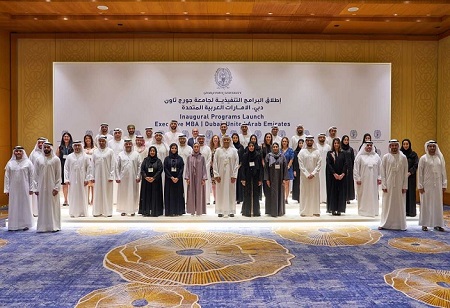-
Starting one’s career with a degree from a top-ranked university undeniably provides a competitive advantage and represents a dependable route to securing employment with prominent organisations. The educational institution from which an individual graduates often wields substantial influence over factors such as initial remuneration and the trajectory of long-term career growth.
However, receiving that initial degree doesn’t signal an end to learning. Rather, it signifies a shift in how and what we continue to learn. Unfortunately, a significant number of professionals tend to overlook the immense value associated with investing in accredited educational programmes as a means to propel their careers forward. In today’s corporate landscape, executives must confront the undeniable reality that business dynamics have undergone a rapid transformation over the past few decades. This transformation, catalysed by technological advancements, policy alterations, and changes in societal norms, has ushered in a new era of challenges and opportunities. Yet, the synergy between leadership and the imperative need for continuous upskilling is frequently marginalised on the broader business agenda.
Upskilling programmes and courses have long been associated with lower and mid-level management, but the truth is the reality is that their impact transcends organisational hierarchies and can play a pivotal role in shaping the mindset and approach of even the highest echelons of the leadership spectrum. A comprehensive study conducted by McKinsey underscores this point, revealing that organisations that allocate resources to leadership development initiatives are approximately 1.5 times more likely to position themselves within the top quartile of financial performance within their respective industry sectors. This underlines the intrinsic value of upskilling, extending its significance to encompass leaders and C-suite executives at all levels of the corporate structure.
Among the array of options available for ongoing learning and leadership advancement, the pursuit of an Executive MBA (EMBA) from a renowned and top-ranked university can emerge as a highly rewarding investment for leaders, and there are several reasons why. EMBA programmes, as a critical component of executive education, effectively harness the esteemed legacy and academic prowess of leading universities. These programmes are meticulously structured to offer a robust and demanding curriculum with a laser focus on augmenting the managerial proficiencies of senior executives – providing an excellent opportunity for them to develop their skills and expand their horizons.
Beyond the scholastic realm, EMBA programmes serve as an excellent opportunity for networking. By bringing together accomplished professionals and leaders hailing from a diverse array of industries and backgrounds, these programmes create a fertile ground for meaningful interactions. Participants can engage and pick up key learnings from each other’s experiences and expand their professional network. This network, in turn, becomes an indispensable asset for continued career advancement. Most importantly, it enhances the credibility of the individual and showcases their commitment to their professional development, while also demonstrating that the individual has the skills and knowledge necessary to be an effective leader and make strategic business decisions. For leaders in the Middle East market, Georgetown University has introduced an exceptional opportunity for leaders in the Middle East market with the launch of its Dubai-based Executive MBA (EMBA) programme. Distinguished as the sole offering in the region from a top-tier U.S. business school, this programme aims to elevate experiential learning, providing a strategic platform for senior decision-makers and executives to enhance their international and regional business acumen.
Building upon the illustrious achievements of Georgetown’s renowned Executive MBA programme, a distinguished US programme recognised by the Financial Times, this Dubai-based initiative draws upon the expertise of Georgetown’s McDonough School of Business faculty in Washington, D.C. The curriculum encompasses four pivotal domains, namely core foundations, regional expertise, future focus, and immersive experiences, all seamlessly integrated over the span of 20 months.
The course content is comprehensive, delving into crucial subject matter for senior administrators, including aspects of business and global affairs, public-private partnerships, business analytics, sustainability, the future of work, and FinTech. Furthermore, upon completion, graduates gain entry into Georgetown University’s extensive global network, encompassing over 200,000 alumni. In the contemporary and intensely competitive business landscape, it’s abundantly clear that leaders and C-suite executives can ill afford to remain stagnant or complacent. They must be compelled to maintain a relentless commitment to self-improvement. This perpetual quest for growth and development is imperative to not just remain relevant but to consistently outpace the ever-evolving curve, ultimately steering their organisations towards triumph.
Such an enduring journey toward success is feasible only when these executives make strategic investments in themselves, their career trajectories, and their organisations. This deliberate and proactive approach serves as the cornerstone for nurturing sustainable dividends and enduring successes that will continue to bear fruit for years to come. By making these investments, leaders fortify their capacity to tackle the formidable challenges of the modern business environment and craft a legacy of accomplishment that endures through time.
🍪 Do you like Cookies?
We use cookies to ensure you get the best experience on our website. Read more...

